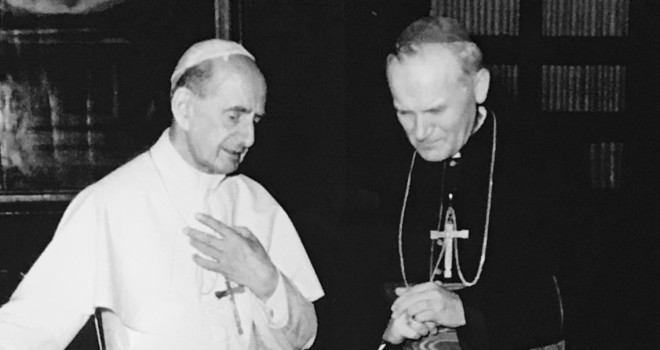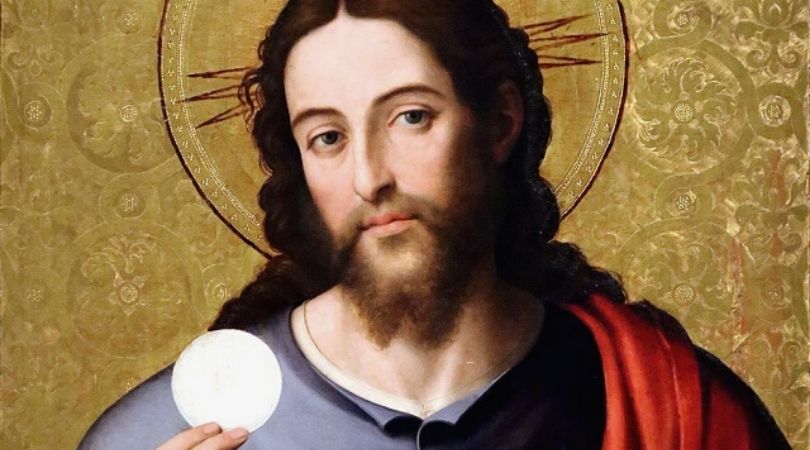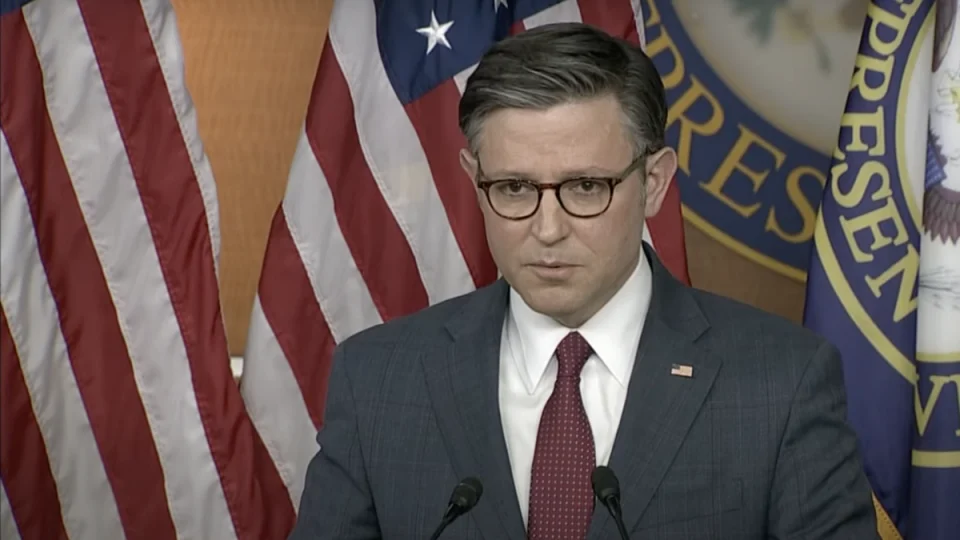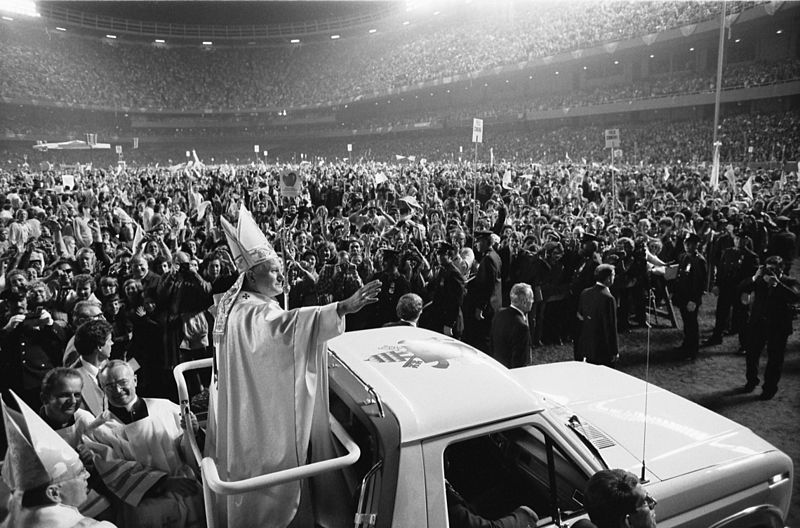Saint Pope Paul VI (1897-1978) was born in northern Italy and elected the Vicar of Christ during the turbulent 1960s and 1970s. Before being elected to the papacy, he had earned a doctorate in canon law and served as the Vatican Secretary of State, as well as the archbishop of Milan. Upon the death of St. Pope John XXIII, the Second Vatican Council was halted, but St. Pope Paul VI re-opened it and brought about its conclusion in 1965.
Saint Pope Paul VI was an extremely humble man. After his death, it became known that, during his papal visit to the Philippines in 1970, he had been stabbed in the chest in the Manila airport by a Bolivian poet and artist who had disguised himself as a priest. The man who stabbed him, Benjamin Mendoza, had purchased a dagger in a Muslim thrift shop.
Interestingly, the miracle that was approved for Pope Paul VI’s beatification was worked through the relic of the blood left on his vestment from the stabbing. The case involved an unborn child in his mother’s womb that had suffered brain defects during pregnancy. The mother’s physician advised her to abort the child, but the mother refused. Instead, she asked for the intercession of Pope Paul VI at the urging of a nun who gave her a holy card with a piece of the pope’s cassock from the attack in Manila. When the child was born, to the surprise of everyone, there were no brain defects.
Interestingly, it had been Pope Paul VI who wrote the landmark encyclical Humanae Vitae that defended all human life and condemned all forms of artificial birth control. Saint Pope Paul VI was known as the “pope of firsts” because he was the first pope to ever fly on a plane, the first pope to visit Fatima, and the first pope to visit the Holy Land since St. Peter. He was canonized on October 14, 2018. His feast day is celebrated on September 26.
Marian Devotion
Pope St. Paul VI
Saint Pope Paul VI’s tender devotion to Mary is evident in his request that his first Mass as a priest be celebrated in the Basilica of Santa Maria delle Grazie in Brescia. As a bishop and then later as pope, he frequently spoke at Marian congresses and events in order to encourage devotion to Mary. He considered the Sacrament of Baptism a prolongation of the virginal maternity of Mary and boldly taught that for a person to be a true Christian, they needed to be Marian. In all of his teachings on Mary, he always emphasized that Our Lady is the model of Christian perfection.
Like many of his predecessors, he fervently promoted the month of May as a special time for honoring Mary. He even released an apostolic exhortation titled Mense Maio (The Month of May) on this subject in 1965. The year 1965 was also the concluding year of the Second Vatican Council. At the end of the Council, Paul VI declared Mary the Mother of the Church.
On the 50th anniversary of the apparitions at Fatima (May 13, 1967), he became the first pope to visit Fatima. He visited many Marian shrines during his papacy and wrote the apostolic exhortation Marialis Cultus in 1974. This landmark document sought to correct the neglect in Marian devotion that had occurred after the Second Vatican Council. He also beatified the great Franciscan priest and martyr of charity, St. Maximilian Kolbe.
Champion of the Rosary
During the first general audience of his pontificate, St. Pope Paul VI extolled praying the rosary as an especially beneficial pious practice for all the faithful. He was very much in favor of the family rosary and spoke about it frequently throughout his papacy. He made frequent reference to the importance of meditation during the rosary, stating that the rosary without contemplation is like a body without a soul. While the Second Vatican Council was taking place, he wrote a letter to the papal legate for the Mariological Congress being held in the Dominican Republic and specifically noted that one of the exercises of Marian piety that the Fathers of the Council were recommending was the rosary. Then, in 1966, one year after the Council, he wrote Christi Matri,emphasizing again that the Second Vatican Council had intended to promote the rosary.
In 1967, when he revised the list of indulgences offered by the Church, he simplified the indulgences and limited them to two categories: partial or plenary. The new list contained a section on the rosary and made the indulgences attached to the rosary much easier to understand. In 1969, in honor of the fourth centenary of the document of St. Pope Pius V codifying the form of the rosary, he published the apostolic letter Recurrens Mensis October to promote praying the rosary in October and offering the rosary as a means of bringing about peace in the world.
During his pontificate, many theologians wanted him to revise the prayer of the rosary and break from his predecessor’s acceptance of the pious tradition of the rosary’s origins through St. Dominic. To his perpetual credit, St. Pope Paul VI remained staunchly opposed to such ideas. While he understood there had been legitimate adaptations and developments of the rosary over the centuries, he had no intention of changing the rosary or, as many theologians were suggesting he do, rejecting the consensus of his predecessors about the rosary’s history.
In fact, in the course of preparations for Marialis Cultus, his most well- known Marian document, he regularly sent the drafts back to the theological ghostwriters because he did not agree with their attempts to change the rosary or rewrite its history. He did this four times! It was for this reason that Marialis Cultus took three years to compose. Marialis Cultus was not promulgated until St. Pope Paul VI was satisfied with it. He was a staunch defender of the rosary.
Rosary Gems
The rosary is a Gospel prayer.
~ St. Pope Paul VI
By its nature the recitation of the rosary calls for a quiet rhythm and a lingering pace, helping the individual to meditate on the mysteries of the Lord’s life as seen through the eyes of her who was closest to the Lord.
~ St. Pope Paul VI
The succession of Hail Marys [of the rosary] constitutes the warp on which is woven the contemplation of the mysteries.
~ St. Pope Paul VI
Meditating on the mysteries of the holy rosary, we learn, after the example of Mary, to have peace in our souls, through the unceasing and loving contact with Jesus and the mysteries of his redemptive life.
~ St. Pope Paul VI
The rosary is an exercise of piety that draws its motivating force from the liturgy and leads naturally back to it.
~ St. Pope Paul VI
Do not fail to put repeated emphasis on the recitation of the rosary, the prayer so pleasing to Our Lady and so often recommended by the Roman Pontiffs.
~ St. Pope Paul VI
We like to think, and sincerely hope, that when the family gathering becomes a time of prayer, the rosary is a frequent and favored manner of praying.
~ St. Pope Paul VI
Find more rosary gems in Fr. Calloway’s Champions of the Rosary.









